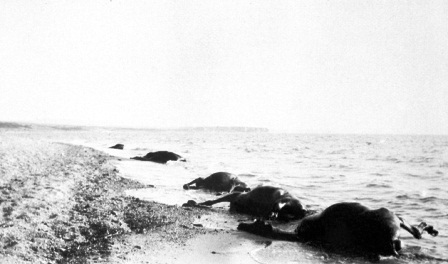28 July 1915
Captain John Gillam, Army Service Corps, 29th Divisional Supply Train - For Gillam and the garrison at Helles it was a quiet time, although shells continued to fall, and the death toll continued to rise. On July 28th he wrote: "At twelve noon high explosive shells come over our camp and kill six fine horses." In the late afternoon more shells came over. "One bursts in Ordnance depot and blows two men to bits. Very glad when I am off duty, but I would rather be here than in Alexandria."
 Gillam continued his diary entry for the day.
Gillam continued his diary entry for the day.
"Nothing much has been done since the battle of June 29th ... everything is very quiet; even the French "75s" hardly fire a shot; but something big is afoot."
Gillam was correct about something big being planned, but until that day materialised life went on as normal, well, as normal as can-be. At Helles, as well as Anzac, there was the problem of how to dispose of the dead horses and mules. Burying them was out of the question.
"Most of the animals which die or are killed are towed out to sea and there sunk, either by the firing of bullets into the carcass or by stones fastened to their legs. Many carcasses are, however, in spite of all precautions, washed ashore, causing great unpleasantness to all near who are living dug into the cliff-side. One such decaying carcass this morning, lying on the water's edge half submerged, aroused the ire of a Staff Officer, who immediately strafed the officer living in the cliff-side nearest to the place where it lay. He politely told that "The Navy are responsible for everything up to the high-water mark," and of course could strafe no more. But the poor Navy have their hands pretty full, keeping the seas open for we on shore, and it is rather hard lines on them to add to their heavy responsibilities the keeping of the shores and beaches clear of washed-up carcasses of poor old mules and horses who have died for their country."
"SOURCE:
Gallipoli Diary by Major John Gillam, (London, George Allen & Unwin, 1918), pp.174-175.
